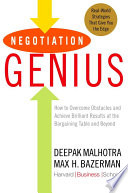

Negotiation is a fundamental aspect of human interaction, and understanding its process is crucial for success. The book emphasizes that negotiation is not just about haggling over price; it involves a series of strategic steps. The first step is preparation, where one must gather information about the other party's needs and interests. This preparation phase sets the stage for effective communication. The authors stress the importance of creating value in negotiations, which can be achieved by identifying mutual interests. This approach leads to win-win outcomes, where both parties feel satisfied with the agreement. By understanding the negotiation process, individuals can approach negotiations with confidence and clarity, ultimately leading to better results.
Continue readingPreparation is highlighted as one of the most critical aspects of successful negotiation. The authors argue that thorough preparation can significantly enhance one’s negotiating power. This includes researching the other party's background, interests, and potential objections. Additionally, negotiators should establish their own goals and limits beforehand. The book suggests creating a 'BATNA' (Best Alternative to a Negotiated Agreement), which serves as a fallback plan if negotiations do not go as expected. A well-prepared negotiator is more likely to remain calm under pressure, make informed decisions, and adapt strategies as the negotiation unfolds. This preparation empowers negotiators to steer the discussion towards favorable outcomes.
Continue readingOne of the central themes of 'Negotiation Genius' is the distinction between creating value and claiming value. Creating value involves expanding the pie before dividing it, which can lead to innovative solutions that satisfy both parties’ interests. The authors encourage negotiators to think creatively and explore options that might not be immediately apparent. In contrast, claiming value focuses on maximizing one's share of the existing resources. The book illustrates that while claiming value is important, creating value can lead to more sustainable and satisfying agreements. Successful negotiators balance both approaches, knowing when to collaborate and when to assert their own interests.
Continue readingEmotions play a significant role in negotiations, and 'Negotiation Genius' delves into how to manage them effectively. The authors explain that emotions can influence decision-making and the dynamics of the negotiation process. They provide strategies for recognizing and addressing emotions, both in oneself and in others. For instance, remaining calm and composed can help maintain control over the negotiation. The book also emphasizes the importance of empathy and active listening, which can help build rapport and trust. By understanding and managing emotions, negotiators can create a more positive atmosphere conducive to reaching agreements.
Continue readingCommunication is the backbone of negotiation, and the book outlines various techniques to enhance communication skills. The authors stress the importance of clarity and conciseness in conveying messages. They recommend using open-ended questions to encourage dialogue and gather information. Additionally, active listening is presented as a crucial skill that helps negotiators understand the other party’s perspective and interests. The book also discusses the impact of body language and non-verbal cues in negotiations. By mastering effective communication techniques, negotiators can foster a more collaborative environment and increase the likelihood of achieving favorable outcomes.
Continue readingThe book explores how negotiation strategies can vary across different contexts, such as business, personal, and international negotiations. Each context presents unique challenges and dynamics that negotiators must navigate. For instance, negotiating in a business setting may require a focus on financial outcomes, while personal negotiations might emphasize emotional considerations. The authors provide examples and case studies that illustrate how to adapt strategies to fit the context. Understanding the nuances of different negotiation scenarios allows negotiators to tailor their approaches and achieve better results.
Continue readingFinally, 'Negotiation Genius' emphasizes the importance of building and maintaining long-term relationships through negotiation. The authors argue that successful negotiators are not just focused on winning a single deal but are also concerned about the future interactions with the other party. They provide strategies for fostering trust and collaboration, which can lead to more fruitful negotiations in the long run. By prioritizing relationships, negotiators can create a positive reputation and open doors for future opportunities. The book encourages readers to think beyond immediate gains and consider the broader implications of their negotiation strategies.
Continue readingThe reading time for Negotiation Genius depends on the reader's pace. However, this concise book summary covers the 7 key ideas from Negotiation Genius, allowing you to quickly understand the main concepts, insights, and practical applications in around 24 min.
Negotiation Genius is definitely worth reading. The book covers essential topics including Understanding the Negotiation Process, The Power of Preparation, Creating Value vs. Claiming Value, providing practical insights and actionable advice. Whether you read the full book or our concise summary, Negotiation Genius delivers valuable knowledge that can help you improve your understanding and apply these concepts in your personal or professional life.
Negotiation Genius was written by Deepak Malhotra, Max Bazerman.
If you enjoyed Negotiation Genius by Deepak Malhotra, Max Bazerman and want to explore similar topics or deepen your understanding, we highly recommend these related book summaries:
These books cover related themes, complementary concepts, and will help you build upon the knowledge gained from Negotiation Genius. Each of these summaries provides concise insights that can further enhance your understanding and practical application of the ideas presented in Negotiation Genius.